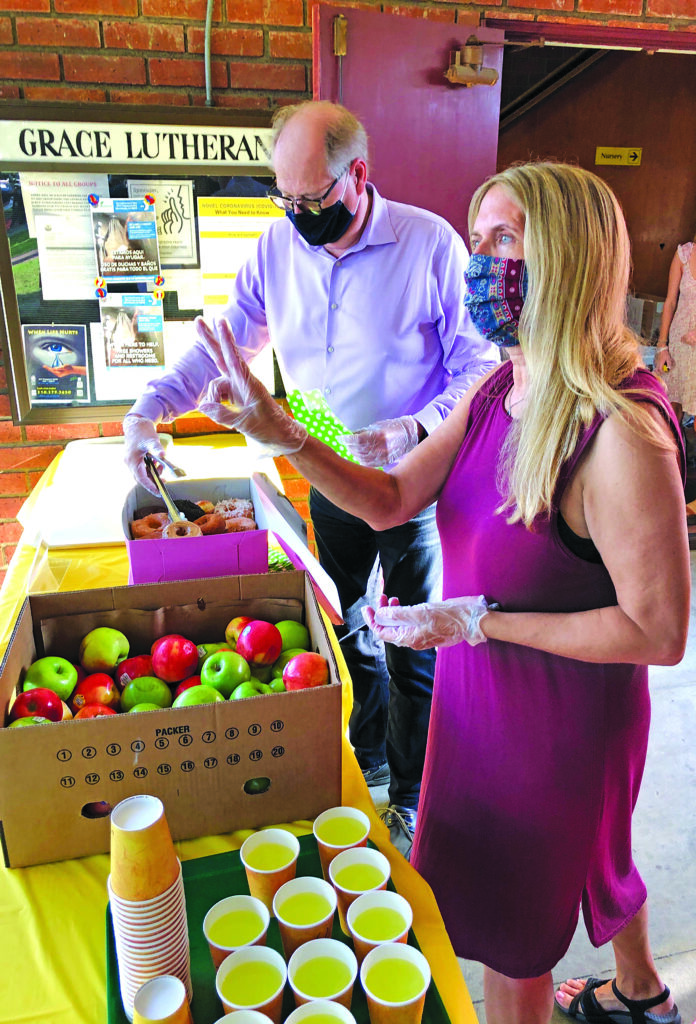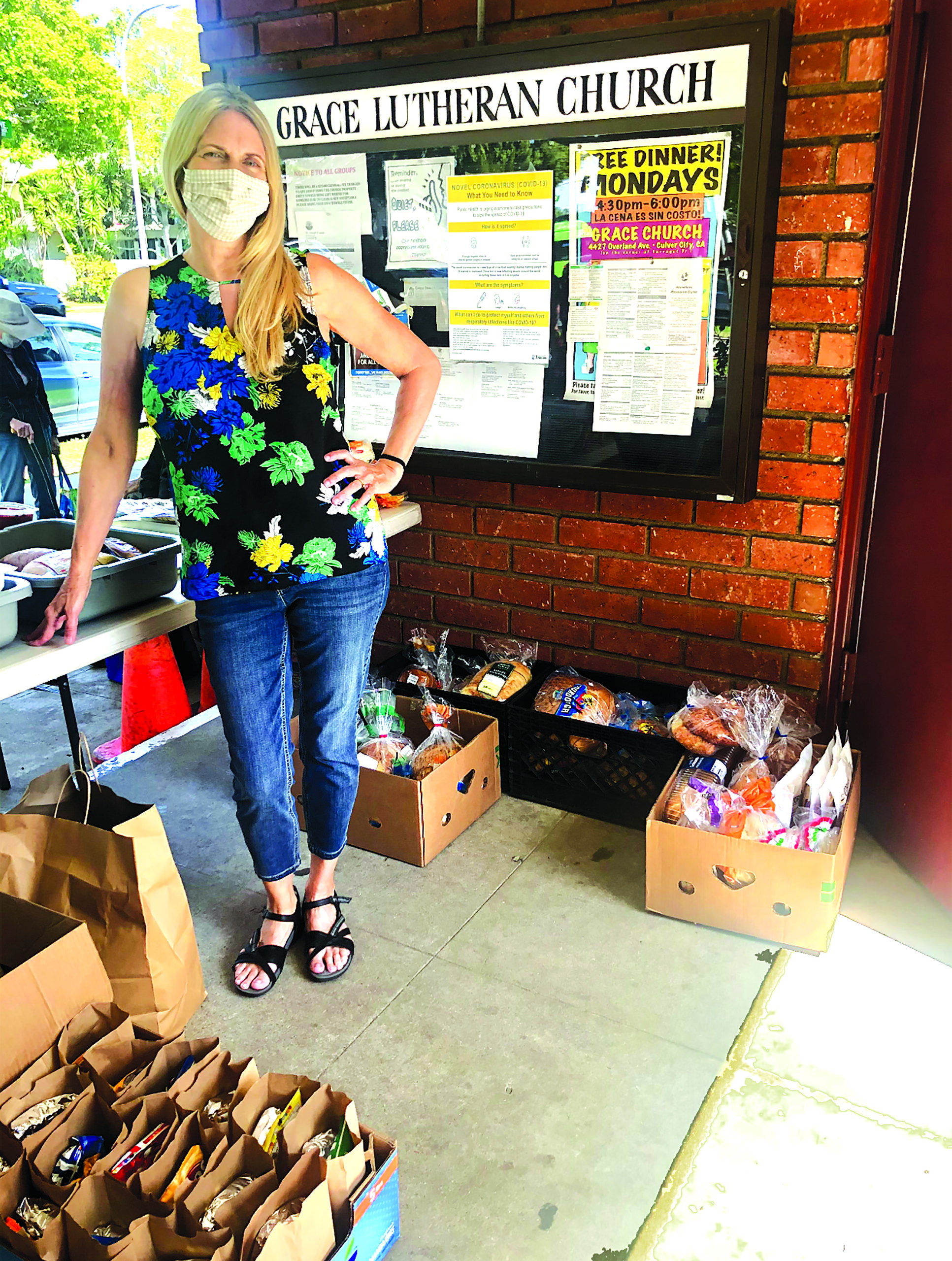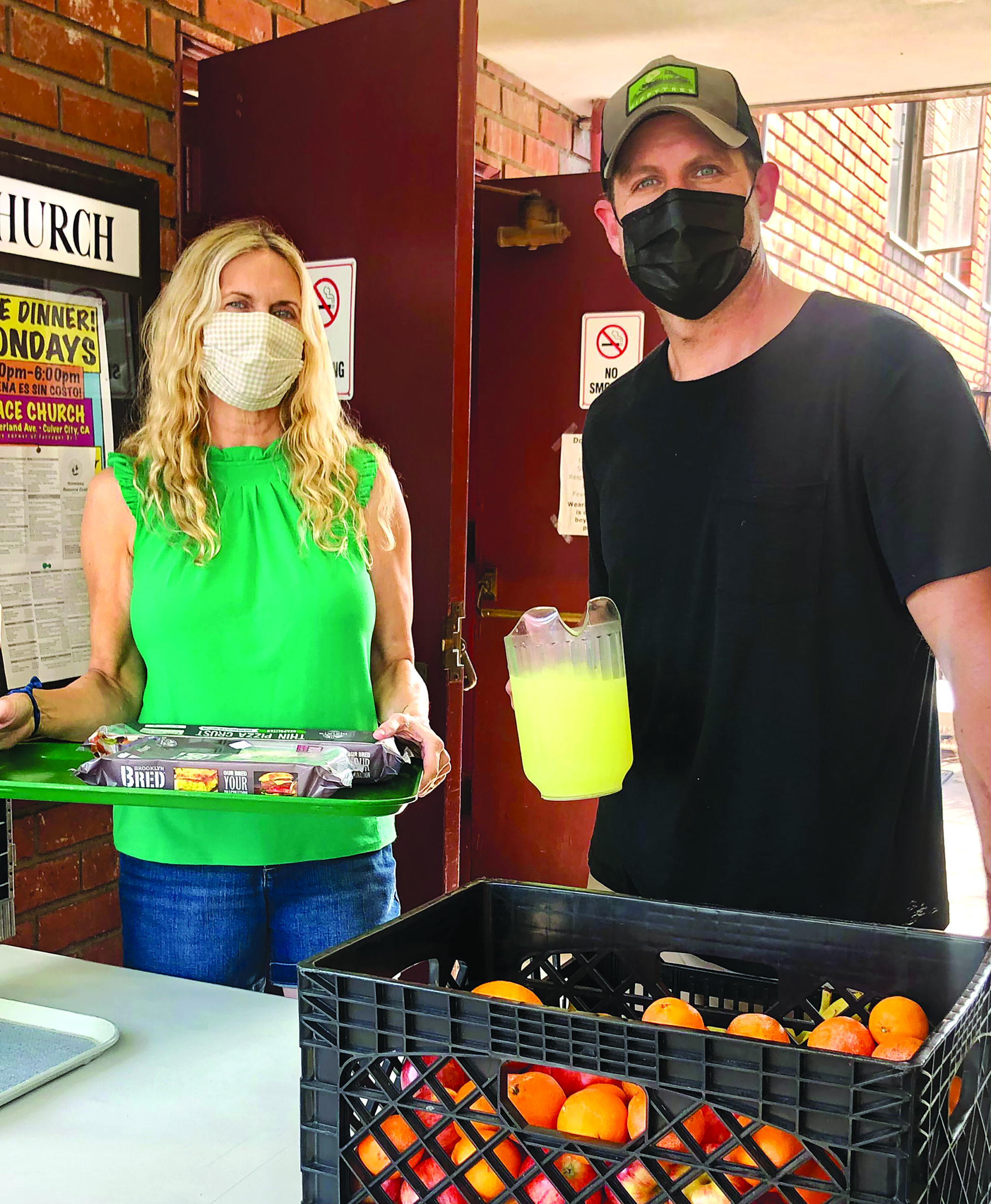
The most popular eats in town isn’t at a five-star restaurant. You won’t be able to find a review of these meals on YELP, either.
Serving 1,000 meals a week has become par for the course at Grace Diner, which is part of the ministry of Grace Evangelical Lutheran Church of Culver City. But while Grace Diner has always “served the community’s underserved,” those in need comprise a changing cliente due to the COVID-19 pandemic, said Lisa Skelley, Grace Diner program director.
“When the pandemic started [in March 2020] and Grace Diner needed to completely adapt the way we serve, we saw our demographics shift dramatically,” Skelley told the News this week. “In addition to feeding the unhoused and low-income individuals, we began seeing young professionals and middle-class families where both parents lost their jobs at the same time. Now, almost 17 months later, we are still serving working people who can’t afford food.”
Started in 2009, Grace Diner served 100 meals a week to hungry citizens in year one. By 2013 that number climbed to 300 meals, as noted on the Grace Church website. Today, pushing past 1,000 meals a week for Grace cannot be accomplished without outside assistance.
“Our FeedCulver partnership has been a total game changer,” Skelley said. “Through FeedCulver’s herculean efforts, we are still receiving 160 meals from local restaurants three days a week. The rest of the 1,000 meals is up to the Diner to provide, so this has added greatly to our costs.”
Councilman Goran Eriksson said in a previous story that the purpose of FeedCulver was twofold — to save Culver City restaurants from being decimated by the state shutdown and to utilize their meals and resources to feed the hungry.
This is where the collaboration between Grace Diner and FeedCulver began.

Skelley said that the church food program has existed for the past 12 years thanks to donations and community support.
“The financial impact has hit us hard — but the on-going generosity of our community continues to amaze us,” she said. “Neighbors walk by the tables where we serve and hand us cash, food and bottled water.”
People can donate to Grace’s efforts through its website at gracediner.org. The diner is 100% volunteer-based so all donations go directly to feeding people.
Despite the hardships that COVID-19 has leveled against Grace Diner’s capacity to help the masses, there have also been some unexpected miracles along the way.
Skelley said that the Diner is now partnering with several organizations: FoodCycleLA, the Culver Palms YMCA, Copia, and the SAVES Food Bank at St. Augustine’s.
She noted how FoodCycleLA is an “unbelievably important part” of Grace’s weekly food distribution.
“[FoodCycleLA] volunteers go around to different grocery chains and load up what is about to be thrown away — the amount of food waste in this country is obscene,” Skelley said. “We distribute about 800 pounds of supplemental food a week from these organizations. We are talking fresh fruits, veggies, breads, dairy products, pre-packed salads and fresh eggs.”
With an appreciation for every bit of food, Grace Diner’s goal is to achieve zero waste.
“We even take any old fruits and bread to a local farmer who feeds them to his goats and chicken — easily my favorite part of my week is playing with the baby goats,” she said with a chuckle.
Skelley said that preserving the dignity and respect of all citizens who show up for food is an important part of Grace Diner’s program. And besides handing out meals, there are other services provided by Grace Diner which aren’t publicized.
“What isn’t seen by the community is how we work with St. Joseph’s [Center] to help get folks into housing, arrange DMV vouchers so that people can get their ID’s replaced and assist in reuniting the unhoused with family members,” she said. “We’ve personally driven several people to the DMV to help them out. When you live on the streets, there is a lot of theft — birth certificates, social security cards — they all get stolen regularly.”
In dealing with such issues as homelessness, Skelly acknowledges that local and state governments do not move at breakneck speed.

“I’ve seen how excruciatingly long the Section 8 process takes,” Skelley said. “We need good, common sense answers to get people housed asap. In the meantime, having good partnerships with like-minded organizations within a community can help make a difference, but it’s so limited in scope.”
Skelley is empathetic toward those individuals who are struggling to cope with day-to-day challenges. She said that Grace Lutheran Church provides several outdoor charging stations and free WiFi to assist diners in their job searches.
“At least four of them found jobs and housing as a result of simply being allowed access to the Internet,” Skelley said. “I wish Culver City would put in solar powered charging stations along major thorough-fares like other cities have done. Being able to charge a phone is a lifeline to those living on the streets.”
Some Culver City officials have been invaluable in providing assistance to help the needy, Skelley said. She mentioned working with Helen Chin, the assistant city manager on homelessness on a vaccine clinic and various other issues.
“She’s been wonderful to us from the start of the COVID-19 crisis,” Skelley said of Chin. From the city council, Skelley said councilmen Eriksson and Albert Vera have been especially helpful.
“Goran has been such a committed supporter of the Diner and without his assistance, Grace Diner could never have carried on this long,” Skelley added.
Eriksson has served as the liaison between Grace Diner and FeedCulver for the last year-and-a-half.
Newly-elected council member Albert Vera has a long history of serving the community through his family business.
“Councilman Vera has always gone above and beyond in helping us provide food to the hungry,” Skelley said. “Sorrento Market donates two large trays of fresh salad each day to us — I can’t tell you what a difference this makes to the diet of the unhoused.”
She noted how people’s faces “absolutely light up” when they attend the Diner for the first time and are offered a salad.
Skelley said she hopes others will get behind Grace Diner’s efforts.
“I would like to extend an invitation to Mayor [Alex] Fisch to stop by and see us in action,” she said. “The food we serve is important, but so is the uplifting and caring atmosphere that Grace Diner provides. We believe our work here is important. By helping a population of folks who are often invisible in our society, we are striving to make a difference in our community.”












